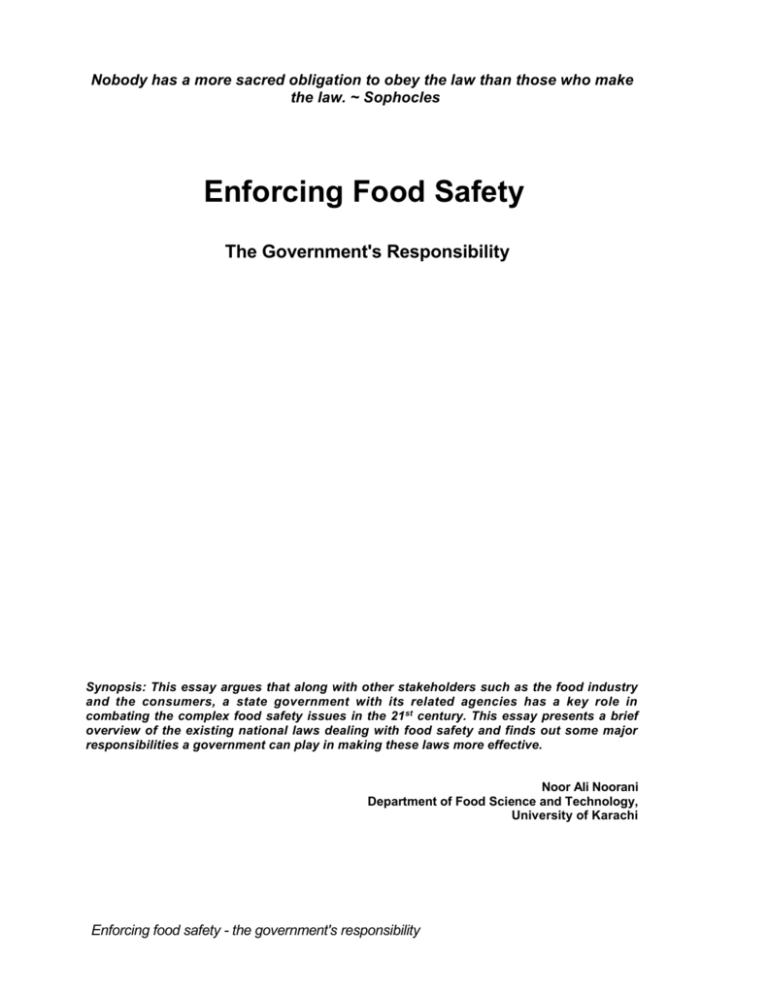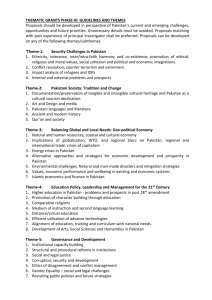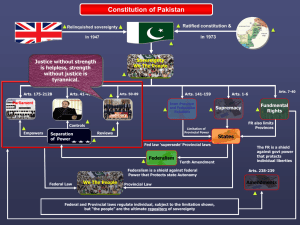Noor Ali Noorani – “Enforcing Food Safety – The
advertisement

Nobody has a more sacred obligation to obey the law than those who make the law. ~ Sophocles Enforcing Food Safety The Government's Responsibility Synopsis: This essay argues that along with other stakeholders such as the food industry and the consumers, a state government with its related agencies has a key role in combating the complex food safety issues in the 21 st century. This essay presents a brief overview of the existing national laws dealing with food safety and finds out some major responsibilities a government can play in making these laws more effective. Noor Ali Noorani Department of Food Science and Technology, University of Karachi Enforcing food safety - the government's responsibility According to the Codex Alimentarius Commission of the United Nations, a food is regarded as safe "If it doesn't cause harm to the consumer when prepared and/or eaten according to its intended use". This entails that food should be free from contaminants, adulterants, naturally occurring toxins and all those substances which might have adverse effects on human health. Right from the earliest days of human existence, access to good quality food, in particular safe food has been one of the most pressing and critical questions for the mankind. Through centuries of ignorance, experience and trial-and-error methodology, we have learnt that safe food is not just a fundamental precondition for human survival but is also inherently and indispensably linked with social, economic and ethical facets of our lives. Today, nations all around the world acknowledge that without surety of the safe food, prosperity in its collective sense is a far cry. Based on such concrete conclusions, it is now of utmost importance that we augment our understanding regarding the current world scenario and re-evaluate our strategic approach that will be required to unknot the complexities of providing safer and healthier food to every human being in the world. Over the last few decades, the question of ensuring adequate food safety standards has evolved into a much more complicated problem with a series of interconnected factors to be considered. On one hand, the scientific and technological advancements such as the development of high precision analytical equipments and improved agricultural and preservation techniques have made it possible for us to evaluate and eradicate many of the existing potential safety hazards. Yet on the other hand, some of the modern scientific practices such as increased usage of chemicals and other additives have also introduced such detrimental changes in the entire food supply chains which were never envisaged in the entire history. Moreover, factors such as ever-increasing population, global financial recession and rising media exposure with consumer awareness have added many newer dimensions to the food safety issue. Keeping an eye over these constantly emerging interrelated concerns, it is undoubtedly the need of the time that we adopt a multidimensional approach at all levels of a food chain i.e. from farm to fork. Stakeholders such as the food industry and the consumers also have a role to play but it is the state government along side its associated agencies which has the ultimate responsibility to establish a solid legal infrastructure for other stakeholders and occupy an imperative position in developing and enforcing food safety standards at all levels. It is often misunderstood that the sole liability of the government and its agencies is to provide a legislative and regulatory framework and lay down certain mandates for those involved in provision of food to the people. These conditions may include compliance with the approved procedural specifications, fulfillment of bio-safety guidelines and proscription of the production and sale of the adulterated and contaminated foods etc. At this moment if we talk about Pakistan, most of the food laws existing deal with production, distribution and food supply in addition to dealing with mere profit exploiting and hoarding. Specifically, there are four laws present in the aspect of Food Safety and are related directly to this issue. According to USDA's annual country report for Pakistan, food imports are generally regulated by the Federal government and food standards are regulated by the Provincial together with of the local health authorities. The Pakistan Pure Food Laws (PFL) devised in 1963 forms the basis of the entire existing trade-related food quality and safety legislative framework. Working with an aim of preventing food adulteration and assuring adequate level of purity, it covers around 104 different food items ranging from edible oils and fats, cereals, fruits and vegetables, dairy products etc. It sets the regulations addressing the usage of preservatives, antioxidants, colorants, flavorants and other food additives and forbids the production, sales and trade of all such unsafe food items which violate the prescribed rules and are likely to prove harmful for the health. In addition to this, PFL issues a defined set of instructions for the food safety aspects such as labeling of food packages, preventive measures in storage and transport, and aims of providing a platform for laboratory analysis and inspection of food samples. Another law of similar in its operational approach, the Cantonment Pure Food Act of 1966 applies food safety regulations exclusively on the cantonment areas. The Pakistan Hotels and Restaurant Act of 1976 makes it obligatory for hotels, restaurants and caterers all over Pakistan to control and regulate their rates and standard of services. Section 22 of the act declares that the sale of food and beverages which are prepared/served in unhygienic conditions or contain contaminated/ injurious substances is an offense and any person/organization found guilty is likely to receive severe lega l penalties. The Pakistan Standards and Quality Control Authority Act is relatively a new law with its induction in the year 1996 and is not generally classified as a food law. This act supplies a platform for the establishment of the Pakistan Standards and Quality Control Authority (PSQCA). Working under the patronage of the Ministry of Science and Technology, it is the premier standardization body working with 81 scientists/engineers and 254 supporting staff as self-finance organization with a primary task of not only formulation of Pakistan Standards, but also its promulgation. Apart from these basic food safety regulations, there are a number of other law enforcing and regulatory bodies that are working in direct and indirect correlation with the concerned issue. Generally, the government still relies heavily on the Codex Alimentarius standards and guidelines developed jointly by the FAO and WHO for setting and revising its requirements for labeling, packaging, food additives, pesticides and imported food products. Food standards which are specified by the United States Food and Drug Administration (USDA) and Food and Drug Association (FDA) are also used for certain products. Moreover, government agencies such as the Customs Department and Plant Protection and Quarantine (PPQ), Pakistan Council of Scientific and Industrial Research (PCSIR), National Institute of Health (NIH), Pakistan Agriculture Research Council (PARC) and Pakistan Council for Research in Water Resources (PCRWR) are also working for the focal point of achieving food safety objectives in their respective premises. In the presence of so many agencies and available regulations, it is however a harsh reality that the prevailing situation of food safety and security standards in the country is dark and dismal. In the wake of this plethora of regulations and regulatory bodies, the presence of such deteriorated structure indicates towards a fact that the influx of laws and regulations and establishment of regulatory bodies is certainly not the sole way of combating the safety issue and there exists severe glitches in our law enforcement and implementation policies at all levels. Like most of the developing countries around the world, Pakistan has a very basic and undeveloped food system with multiple problem areas such as fundamental differences in agency missions and approaches to inspection, non-uniformity of facilities, unavailability of skilled personnel and money wastage on nbn-essential issues with efforts lagging in the development of new technologies for controlling concerns. To an extent, it will be reasonable to say that Pakistan does not have an integrated food safety framework at all but has a set of laws dealing with some selected aspects of food safety. Though laws have the potential to achieve food safety standards to an extent, the absence of their understanding and implementation at all levels of the governments leaves too many loopholes to be filled. There is an urgent need to understand that a government in its truest sense has the responsibility of developing a comprehensive, personalized and integrated food safety framework which does not necessarily deals with protection, but also with health maintenance and promotion. Fairly achieved in developed countries like Canada, UK and the USA, we really need to sketch out a well-conceived national food control policy developed with the support of the various participants. This policy should elucidate role of the governmental hierarchy, different agencies, various sectors of economy and consumers, and should ascertain mechanisms for cooperation with means of dealing with emerging challenges in regard to human health and the national economy. There is an acute need to understand that the formulation and functionality of the entire system is dependent on the way the responsibilities are transferred and enforced at levels of a governmental structures and state actors such as the federal, provincial, municipal governments, independent health agencies and nongovernmental organizations. At the top of the ladder, the most critical responsibility of the State or Federal ministries (Food, Health etc.) is to structure a centralized vision with Risk Assessment, Risk Management and Risk Communication as its broad guiding principles. Since Risk Assessment and Risk Management deal with scientific and socio-economic arenas respectively, it is a prime task of the state government to develop a scientific and legal amalgamation and supervise its implementation right till the grass roots. Other important responsibilities of the state government include: Assessment of raw materials and finished products and identification of critical control points throughout the system. Allocation of appropriate funds for the provincial governments to uplift their food safety programs. Introduction of stringent monitoring systems of sampling and thorough inspections before approving food imports. Evaluation of the laws and standards adopted from international bodies and their localization in accordance with our needs and resources. Replacement of 'Hands-on' approach with new techniques and establishment of up-to-date laboratories and research centers with latest equipments and other analytical facilities. Development of the transport system all through Pakistan to minimize microbiological losses. Enforcement of basic hygiene practices and safety and quality management systems such as ISO: 9001-2000, HACCP and ISO: 22000 at every level. Coming next in line, the Provincial governments have the responsibility of taking the message from the central authorities and implement it in their respective provinces. Whatever the plan of action they adopt, it should not in any way deviate from the regulations set by the state. Working on a unified vision, each province should initiate its own operations in accordance with its priorities and resources. Just like the inauguration of a Parha Likha Punjab Campaign (Literate Punjab), every province should invest in such programs for awareness about food safety and should incorporate these operations to all districts, cities and villages in its jurisdiction. Other responsibilities include: Assessment of raw materials and finished products and identification of critical control process points at provincial level Continuous surveillance of the entire supply chain including farmers, processors, suppliers, wholesalers, retailers etc. with special attention to the execution of the regulations and predefined criteria. Introduction of technical programs for training of small farmers and other producers at the grass root level concerning basic food safety and hygiene principles. Funding for new graduates who pursue governmental public health careers and enhance state efforts on recruitment and retention of public health professionals. Establishment of 'Emergency Recall System' at the time of a catastrophic outbreak. Re-invention of procedures and development of capacities to support health agencies during recalls and outbreaks. Impeachment of the people/organizations breaching the regulations with autonomy granted to agencies to immediately ban such business, independent of the court decisions. Despite being at the lowest end of the command order, the Municipal/City/District government has one of the most critical roles to play in implementing and enforcing food safety standards. Being the most familiar with the ground realities, municipal government has a superior chance of understanding situations and then act appropriately. Some of its key responsibilities include: Continuous food safety surveillance of the different food chains including industries, hotels, restaurants, cafes with appropriate penalties and prohibitions for offenders. Enhanced facilities for action based approach on consumer complaints. Recruitment of skilled and sincere personnel for the inspection and scrutiny of general practices. Conclusively, we can say that seeing the devastating consequences of the recent system failures in countries such as China, the issue of food safety can not taken lightly. The ever increasing complexities of food system with rapid and almost explosive technology have made it essential that the issue of food safety be considered as an integral part of the national planning. The government and other state players should therefore realize that they occupy an extremely decisive position and any ambiguity or negligence in understanding or implementation of food safety regulations might lead us to a catastrophe. References: 1- International Food Regulation Handbook - Roger D. Middlekauff 2- Obama- Biden Transition Report - Association of State and Territorial Health Officials USA 3- Report 'Food Legislations in Pakistan and identifying Entry Points for Public Intervention' Consumer Rights Commission of Pakistan (CRCP). 4- Pakistan FAIRS Country Report 2008 - US Foreign Agriculture Services 5- Report 'Benefits and Costs of Food Safety Regulations' - John Antle, Montana State University, USA 6- Websites: • • • Food and Agriculture Organization (FAO) World Health Organization (WHO) Ministry of Agriculture, Food and Rural Affairs, Canada







